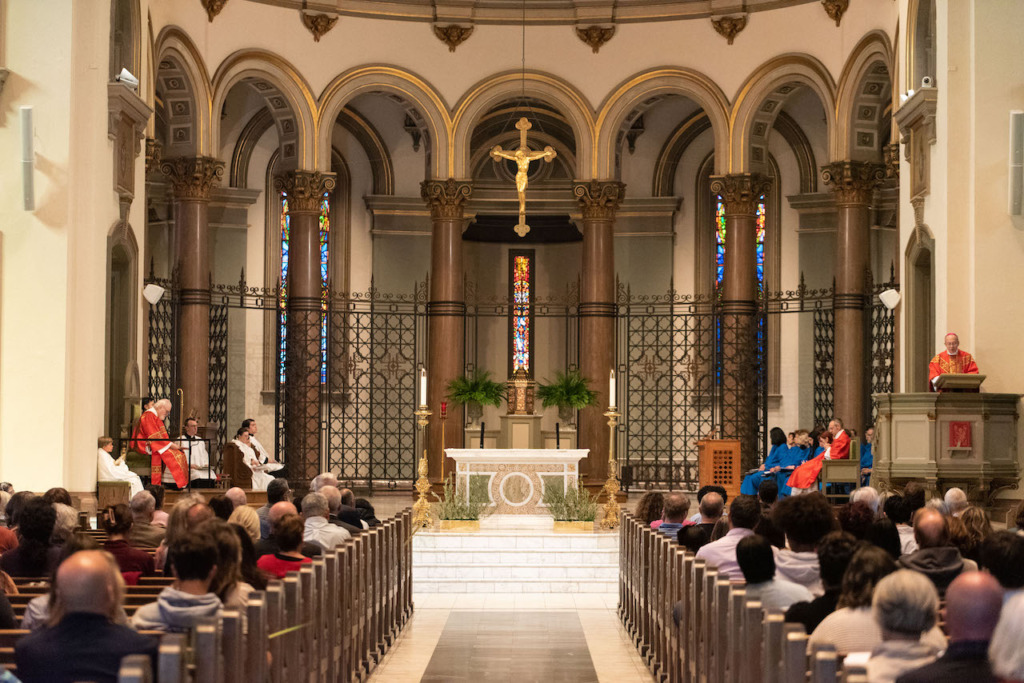When I reflect on the events in Scripture surrounding the commemoration of Holy Week and Easter, I’m struck by the fickle nature of our humanity. Although the events commemorated during the liturgical season took place in first century Palestine, the human tendency to waiver in our resolve remains, in many respects, unchanged.
Like the Jews in Jesus’ time, we enter Lent resolving to hear the Good News and turn away from sin as we journey toward Easter. However, before we can sing “alleluia,” we must travel by way of Jesus’ Passion and death.
We begin Palm Sunday by way of a celebratory procession, singing, “Hosanna in the highest, blessed is he who comes in the name of the Lord,” only to reverse course minutes later as the Passion and death of our Lord is solemnly proclaimed, when we cry, “Crucify him!”
It’s this radical shift from triumph to tribulation that causes me to wonder if we’ve grown so accustomed to the Palm Sunday liturgy that we no longer recognize how this shift mirrors the ease with which the human heart can be swayed.
For many Catholics, the days between Palm Sunday and Holy Thursday are typically business as usual, but when we consider that Monday, Tuesday and Wednesday are also part of the week we call holy, they should not be dismissed as unimportant. The liturgical readings of those three days, particularly the Gospels, offer much food for thought, setting the stage for the drama of the Sacred Triduum.
Monday’s Gospel (Jn 12:1-11) takes us to Bethany where Mary anoints the feet of Jesus with precious ointment while Judas, wanting the money for himself, berates her for wasting money on precious nard. Not only did Judas’ greed blind him from recognizing the prophetic action of Mary, he compounded it by lying about his motives.
However, this Gospel is not just about Judas; it’s about us and the blindness, ignorance and greed that keep us from reverencing God and loving our neighbor. And so, we do well to ask: Has greed caused me to hoard the gifts I’ve been given and then compound my selfishness by lying to myself to justify my actions?
On Tuesday, the Gospel (Jn 13:21-33, 36-38) invites us to reflect on Jesus’ prediction of his betrayal by one of his own, to which Peter boasts, “Master, I will lay down my life for you.” Although Peter loved Jesus, his love had yet to be tested and when the hour of proving his love came, Peter not only fled, but denied Jesus, just as the Master had predicted.
And so, we pause to reflect: When have I, like Peter, promised to do good and then failed to follow through because it seemed too difficult, unappealing or inconvenient? Then becoming fearful, I took the easy way out, and like Judas chose darkness.
Wednesday’s Gospel (Mt 26:14-25) once again takes us to the Upper Room where Jesus reveals his betrayer. Dipping a morsel of bread into the dish, he hands it to Judas, who shamelessly asks, “Surely it is not I, Rabbi?”
As we reflect on these words, we might ask: Have I denied, excused or defended myself by pretending that I have done no wrong?
Every sin is an act of betrayal toward God, so when I approach the altar to receive the Eucharist, do I do so with humility, acknowledging my unworthiness, mindful that I am receiving the actual Body and Blood of Jesus? And do I thank him for the tremendous gift that is ours?
Like every pilgrimage, our journey to- ward Easter has its inevitable ups and downs. Therefore, as we approach the final days, let’s not be like the runner who breathes a sigh of relief and slows his pace when he sees the finish line. Rather, let’s quicken our pace and deepen our resolve.
Recall that when Cain became jealous of his brother because Abel’s offering was found acceptable, God said, “Why are you so resentful and crestfallen? If you do well, you can hold up your head, but if not, sin is a demon lurking at the door and his urge is toward you, yet you can be his master” (Gen 4:6-7).
We are masters of our will, so regardless of our successes or failures, let’s keep our eyes on the finish line so that when we gaze upon the risen Lord, at Easter and at the end of our life, we will be able to say with St. Paul, “I have fought the good fight, I have finished the race, I have kept the faith” (2 Tim 4:7).
Alleluia! Alleluia!
Barbara Hughes is an author, retreat facilitator and spiritual guide. She lives in Virginia Beach and can be reached at [email protected].

